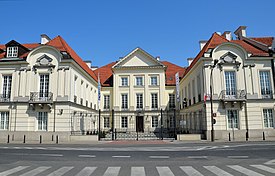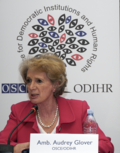Office for Democratic Institutions and Human Rights
 | |
 Młodziejowski Palace in Warsaw, the seat of ODIHR | |
| Office overview | |
|---|---|
| Formed | 1990 |
| Jurisdiction | Organization for Security and Co-operation in Europe |
| Headquarters | Warsaw, Poland |
| Employees | 180 |
| Office executive |
|
| Website | www |
| Map | |
The Office for Democratic Institutions and Human Rights (ODIHR) is the principal institution of the Organization for Security and Cooperation in Europe (OSCE) dealing with the "human dimension" of security. The Office, originally established in 1991 under the 1990 Paris Charter as the Office for Free Elections, is still best known for its role in observing elections although its name changed in 1992 to reflect the broadening of its role by the Helsinki Summit.
Based in Warsaw, Poland, ODIHR is active throughout the 57 participating States of the OSCE. It assists governments in meeting their commitments as participating States of the OSCE in the areas of elections, human rights, democracy, rule of law, and tolerance and non-discrimination. The Office also hosts the organization's Contact Point for Roma and Sinti Issues.
On 4 December 2020, Matteo Mecacci of Italy, received a nomination for the position of ODIHR's Director.[1]
In 2021 the Office had a budget of €16 million and employed 146 people, of which a supermajority were women.[2]
03 September 2024 Dr Tea Jaliashvili was entrusted with ensuring the uninterrupted implementation of ODIHR’s mandate function.[3]
In 2024, ODIHR was included in the unofficial list of five possible candidates for the Nobel Prize for peace issued annually by the Peace Research Institute Oslo (PRIO).[4]
ODIHR activities
The ODIHR has observed more than elections across the OSCE region and has deployed some 75,000 observers.
The Office organizes the annual OSCE Human Dimension Implementation Meeting in Warsaw, Europe's largest human rights conference.
ODIHR international electoral observer activities
- During the United States elections, 2012—following media reports that tied ODIHR international electoral observers to the United Nations and accused them of having plans to interfere in the election—the observers, who said they were in the United States to review several benchmarks of democratic elections, were blocked from polls in nine of the 50 states—Alabama, Alaska, Florida, Iowa, Michigan, Mississippi, Ohio, Pennsylvania, and Texas.[5]
ODIHR Directors
| Photo | Name and Surname | OSCE participating State | Mandate |
|---|---|---|---|
| Luchino Cortese | 1991–1994 | ||
 |
Dame Audrey Glover | 1994–1997 | |
| Gérard Stoudmann | 1997–2003 | ||
| Christian Strohal | 2003–2008 | ||
 |
Janez Lenarčič | 2008–2014 | |
 |
Michael Georg Link | 2014–2017 | |
 |
Ingibjörg Sólrún Gísladóttir | 2017–2020 | |
| Katarzyna Gardapkhadze – Alternate Director | 2020 | ||
 |
Matteo Mecacci | 2020–2024 | |
| Tea Jaliashvili – Alternate Director | 2024 |
See also
References
- ^ "Matteo Mecacci appointed Director of OSCE/ODIHR". www.esteri.it. Retrieved 2022-07-01.
- ^ "Democracy and Human Rights in the OSCE" (PDF). Warsaw: Organization for Security and Co-operation in Europe. 2021.
- ^ "Leadership of the OSCE". Warsaw: Organization for Security and Co-operation in Europe. 2024.
- ^ "Nobel Peace Prize 2024: PRIO Director's Shortlist Announced". www.esteri.it. Retrieved 2024-03-06.
- ^ Donovan Slack (November 6, 2012). "International Observers Blocked From Polls". Politico.com.
A group of international electoral observers has been blocked from polling places in nine states and has had to take precautions in the face of security threats.

